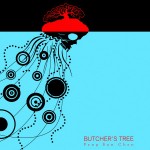Butcher’s Tree by Feng Sun Chen | Black Ocean 2012 | $14.95
MULDER: When Victor Frankenstein asks himself, “Whence did the principle of life proceed?” and then as a gratifying summit to his toils creates a hideous phantasm of a man, he prefigures the Postmodern Prometheus: the genetic engineer whose power to reanimate matter (genes) into life (us) is only as limited as his imagination is.
—The X-Files Episode 5×06, “Post-Modern Prometheus“

Emptied peanut butter jars are evidence of The Great Mutato’s presence in The X-Files episode “Post-Modern Prometheus.” A rejected genetic creation of Frankenstein-like scientist Dr. Pollidori, The Great Mutato’s deformities banish him to a dark cellar, where he eats peanut butter sandwiches and hungers for human connection. Feng Sun Chen’s Butcher’s Tree excavates the cavities in which such mythic, hybrid and feral figures as The Great Mutato, Prometheus, Wukong and Grendel dwell and, by placing a mouth to the opening, “eat[s them] up from the inside” (5).
Chen writes of feral creatures that are “[p]eeled from living rock” (65), birthed from stone, petri dish or sea, whether genetically engineered or spiritually divined; that share a certain “fall from grace;” and whose bodies (or whose power to create living forms) usurp the dominion of the immortal. As such they blur the lines between “god” and “man,” and as myths are imagined to possess monstrous shells, scales and hideous skins, but no souls. They are imagined as cavities, or as caves. In these hollowed spaces, creatures (the created) fill the emptiness with hunger. Chen writes, “[s]ilence, which is not additive, / can be filled with anything” (58). This hollowness is completely full of “everything that waiting breeds” (49), like the “trigger of longing” (44) and “alive loneliness” (32). In these cavities, “hearts [grow] teeth” (4).
A series of poems centers on Wukong, a shape-shifting Monkey King born from stone and the main character in the novel Journey to the West by Wu Cheng’en. Chen writes that “he felt like a salmon inside a bear” and that “[e]ven in his dreams it was something else that moved / through him”—”[s]omething watched himself dream” (17). The nodes or root beings of Chen’s Butcher’s Tree share the desire to be inside something else, or are outside watching themselves—”When the soul steps from the body // and watches the body / and the body is flayed” (7). They are beings through which other energies move, and are constantly rearranged by grammar and outer skins. In all their hunger, they wish for “the world to pass through [them]” (91), but what they eat is not often easily digested, or easily let go.
When [Wukong] looked at the girl with transparent flippers, he knew that if he looked at her underneath side, he would be able to hear a sound of the wind leaving, or water falling. It would be salty. It would be alive. It would contain a creature with a heart that used no arteries or veins but whose blood bathed its organs in a single cavity. He thought of doors as smacking, windows as puckering. Every opening meant access to the sea now, or the wind on the sea. (18)
Chen’s image of rooted trees or fish bones, with their fern-like accumulation of branches and spines, speaks to a mathematical yet organic pattern. Of all possible reconstructions, Chen invites the reader to reconstruct the body out of “hall[s] of tongues, corridor[s] of knees […] some with just the scalp” (15). In so doing, we question origin. What is birth, really? To be hatched. Chen’s writing is a poetics of mutation and molecular gestation, of cell membranes and excretions, replicating in all cavities of the body. We come to ask, is the generative force of life hunger? And we learn how hunger itself reconstructs the body, how hunger becomes grammar.
But Grendel was hungry. He was hungrier than all the rest. His hunger
made his body magnetic with the rhetoric of hollowness:
Little tiny spikes, little tiny scrapes, rippling with tiny implosions. (66)
In the book’s final section, Chen gorgeously and wrenchingly re-imagines the creature Grendel from Beowulf, not as half man or beast, but as a woman—a trans/gender body. Grendel hungers until all he/she/sie is is hunger, until the body reconstitutes. “[T]his liplessness opened further into the labyrinth” (79), “two silences traveled and made interference waves” (82) and his/her/hir “beautiful beautiful body felt a massive echo” (98). Through each page, each abrupt insertion or amputation or aborted negative space, Chen’s Grendel surprises us with “new splatter” (82), touching us like “a pinprick of sand / within rounded numbness” (81).
Chen’s creatures are here flayed out, “woven into a delicate verge” (60). Take this book and “tuck it in a pocket. / Feel it all day, like a new organ” (41).